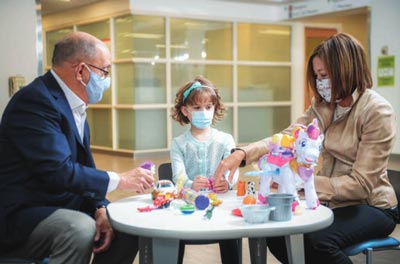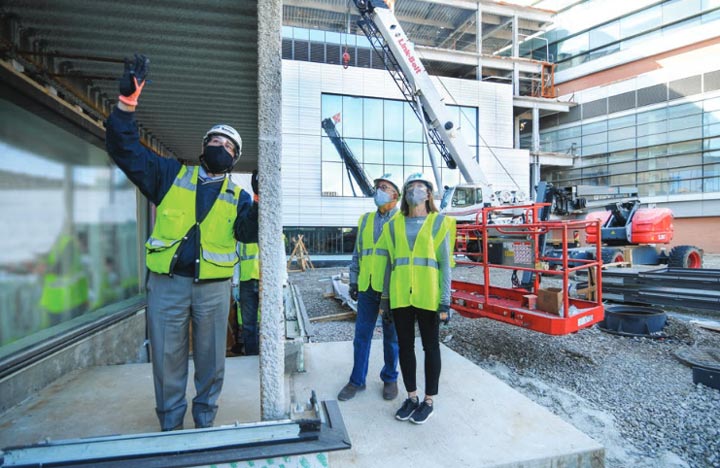Bob and JoAnn Glick are funding a healthcare system they believe in
“She’s the brains,” Bob Glick says, pointing to his wife JoAnn, who is seated beside him in the living room of their Florida winter residence. “Definitely.”
JoAnn swiftly interjects with a wink and a smile, and then moves the conversation along.
Only a few months ago, Clevelanders, Bob Glick, founder and former CEO and Chairman of Dots LLC, and JoAnn Glick, a retired nurse, were able to live their quiet lives under the radar. That has since changed. When the Glicks announced their plans to donate $42 million to the MetroHealth System in Cleve- land, Ohio—the largest gift of its kind in the institution’s 183-year history—they were catapulted into the very public world of philanthropy.
The couple only agreed to make their gift known to the public as a way to inspire others to give to this institution.
“We have the same vision as MetroHealth, and it is so much more than just a health provider,” JoAnn says.
A large portion of their donation is dedicated to helping MetroHealth address the social determinants of health, and in doing so, improve the health and well-being of the community at large.
Since selling Dots—a women’s specialty apparel retail chain that included more than 400 stores spread across 28 states—in 2011, the Glicks decided they wanted to pool their efforts and their capital to help their hometown, Cleveland, which is known to be one of the poorest cities in America.
“We ended up in a much more fortunate position than we thought we could have ever imagined and we wanted to take our time and find the right place,” JoAnn remarks.
Bob’s interest in supporting communities came from his work: He got to know Dots employees and customers well, and they didn’t always come from advantaged homes. Many, he knew, would have struggled to receive proper health care.
“And JoAnn has always said that she wants to leave the world a better place,” he adds.

The Glicks with a pediatric patient.
Married for over 40 years, Bob and JoAnn have affection for each other that is palpable. They are equally aligned in their life’s mission to promote health and wellness, with a focus on helping underserved women and children.
MetroHealth seemed like a natural fit for the Glicks. The nonprofit public healthcare system, owned by the county of Cuyahoga, provides care for over 300,000 patients, roughly 75 percent of whom are uninsured or are government insured through Medicare and Medicaid.
MetroHealth has a reputation for focusing on keeping people healthy instead of solely treating the sick. Its various programs reflect its desire to go above and beyond for its community.
It established the MetroHealth Pride Network, the first of its kind in Cleveland to provide health care spe- cifically to the city’s LGBTQI+ community. Safe, supportive spaces were provided for patients to get routine medical care as well as mental health and gender-related support.
In 2019, MetroHealth took over the health care at Cuyahoga County Jail, bringing in more doctors and increasing medical screenings and ac- cess to mental health care. During the COVID-19 pandemic, physicians worked with public defenders, judges, and the sheriff ’s department to limit the spread of the virus among inmates and jail staff. As a result, an outbreak was avoided and the jail has had zero COVID-19-related deaths, making it a national model for inmate care during the pandemic.
Going a step further to help those in need during the pandemic, MetroHealth used its Doctors on the Streets initiative—a program where doctors and nurses provide basic medical care and winter accessories to Cleveland’s homeless population—to distribute face masks and conduct COVID-19 screenings for those living in shelters, in homeless camps, and even under bridges. The MetroHealth Institute for H.O.P.E. coordinated the health system’s efforts to deliver meals, toiletry kits, and other supplies to people living in men’s and women’s shelters and to homeless people recuperating from COVID-19 at other locations.
“Between Bob’s desire to give back to his Dots customers and associates, of which the majority are women of color who live in underserved urban neighborhoods, and my continuous goal to push for preventative care in our healthcare institutions, our interests really intersected at Metro- Health,” JoAnn explains.
The Glicks took their time and did their due diligence, thoughtfully researching and exploring numerous organizations in order to determine where their dollars would have the most impact.
“It’s like private equity—we wanted to make sure that the money we are donating pays off,” Bob says.

Construction at the new MetroHealth building.
More than a decade ago, the couple established The JoAnn and Bob Glick Family Fund through the Cleveland Foundation, an organization that offers giving opportunities for the city’s community. According to the foundation, the fund has granted nearly $2 million to local organizations in the last 10 years.
In fact, Bob pointed out that it was Ronald Richard, the CEO of the Cleveland Foundation, who suggested the Glicks “think about giving where others don’t give.” The couple took the advice to heart and have incorporated it in all of their giving intentions.
The Glicks’ philanthropic endeavors extend to other local organizations. Bob sits on the board of directors at the Cleveland Foundation and the Cleveland Orchestra, and he serves on the Activant Capital advisory board.
JoAnn recently joined the board of the MetroHealth Foundation and serves on the board of ideastream, a local PBS affiliate. She is also on the advisory committee for Quality and Safety Education for Nurses at the Frances Payne Bolton School of Nursing at Case Western Reserve University, her alma mater.
After the sale of their retail business in 2011, some of the first philanthropic giving Bob and JoAnn did in their community included a generous donation to the Children’s Museum of Cleveland, inspired by an impromptu visit with their grand- children to the museum. Another local organization, The Refugee Response, also caught the Glicks’ attention—it provides programming to help im- migrants adjust to their new lives in Cleveland.
The Glicks, who both grew up in northeast Ohio, are well aware of the health disparities experienced by people of color in their city and in America as a whole. JoAnn, who has a Master of Science in community health nursing, has been interested in preventative health care and education throughout her life. When she was a nurse in the 1970s in urban areas, she became disheartened with the lack of care available for disadvantaged communities.
“I wanted to keep people healthy and to educate them so they could take care of themselves,” she says.
Bob, who was trained as a certified public accountant, developed a deep admiration and respect for his customers and associates. He had always wanted to give back to this community and their families in a much bigger way.
Well before the George Floyd riots, the Glicks felt they needed to do their part to help lessen the social inequities that exist in their very own city. MetroHealth, located on the less-advantaged west side of Cleveland, became the top choice for them because of the hospital system’s commitment to community health.
“We often follow the path that others do not,” Bob says. “When it comes to MetroHealth, we believe it has not received the accolades it so deserves.”
 In 2019, the Glicks gave contributions to two MetroHealth programs as trial gifts: the MetroHealth Autism Assessment Clinic (MAAC) and the Students Are Free to Express (SAFE) Project, an arts-based mental health initiative.
In 2019, the Glicks gave contributions to two MetroHealth programs as trial gifts: the MetroHealth Autism Assessment Clinic (MAAC) and the Students Are Free to Express (SAFE) Project, an arts-based mental health initiative.
“It’s wonderful to see the incredible impact these programs have had on the community,” Bob says.
The couple’s $42 million donation will be split into two funds: The $2 million JoAnn Zlotnick Glick Endowed Fund in Community Health Nurs- ing will provide programming to prepare nurses to take on a leadership role in community health, as well as a professorship in Case Western Reserve University’s Frances Payne Bolton School of Nursing.
“I believe nurses play an integral role in taking community health to the next level,” JoAnn says.
The other $40 million is marked for the JoAnn and Bob Glick Fund for Healthy Communities. This fund is dedicated to supporting programs at the hospital that follow the couple’s philanthropic mission to promote equal access to health care for disadvantaged communities with a special focus on underserved women and children. The programs will operate in a new hospital build-
ing that is currently under construction. The new building will bear the Glick family name, a gesture that the Glicks were at first hesitant to endorse.
“We really believe in the leader- ship of this institution,” explains Bob. “Even after we are not here, the people at MetroHealth will decide what’s best.”
JoAnn points out that their interest lies in equalizing the dis- parities in society that exist. “Metro- Health’s mission is all about providing care for everyone,” she says. “The community needs to know that we really do care about them. We can make them healthier and we can get them to a much better place.”
Bob adds, “We hope to come back and give more. I’m not sure that we’re done just yet.”
After hospitals tried to maintain the best possible patient care during a global pandemic in 2020, the Glicks have allowed MetroHealth to have a running start in 2021. Their year can only get better from here.
This article by Rena Godfrey appeared in the Spring 2021 issue of Lifestyles Magazine.
Photos: Eric Mull Photography & The MetroHealth System
